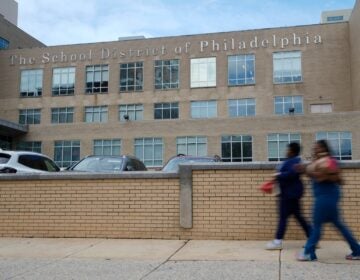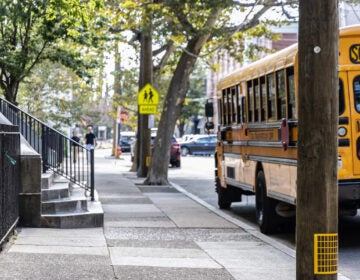A program for ninth-graders in Philly schools helps boost graduation rates
Philly high school graduation rates sit below the national average. The program 9th Grade On-Track ensures participating students have a staff member to mentor them.
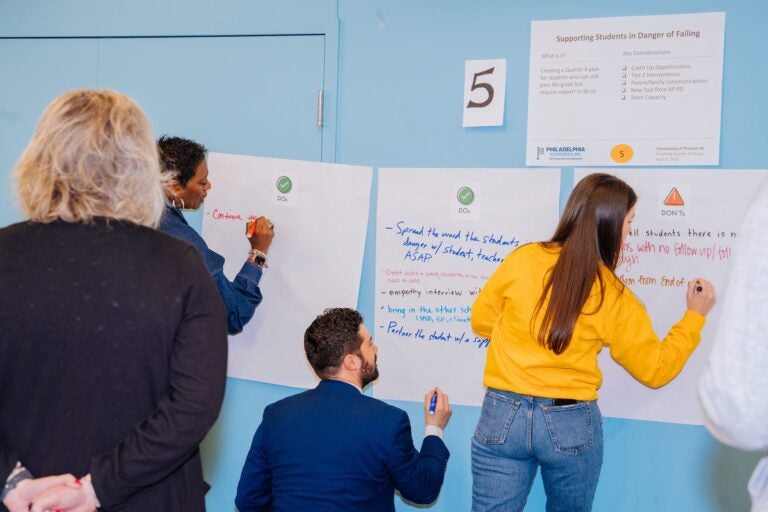
9GSN staff teams from high schools all over the city gather for quarterly Communities of Practice events, where educators can brainstorm together and share best practices. (Philadelphia Academies, Inc.)
From Philly and the Pa. suburbs to South Jersey and Delaware, what would you like WHYY News to cover? Let us know!
Northeast High School students Amaya Sims, Bekzod Davronov and Michael Malebranche had different challenges going into high school.
Malebranche, who started ninth grade after a year of the COVID-19 lockdown, struggled with social anxiety. Sims battled stress and Davronov had family obligations that occupied his mind.
All three said their time at the 9th Grade On-Track program helped them surmount their individual challenges and succeed. Now in its sixth year, the program focuses on boosting graduation rates by fostering closer relationships between students and school staff. It operates in 24 Philadelphia high schools. The program, which is operated by Philadelphia Academies, Inc., received $2.6 million from the School District of Philadelphia and $8 million from the Neubauer Family Foundation. The investment, so far, has paid off.
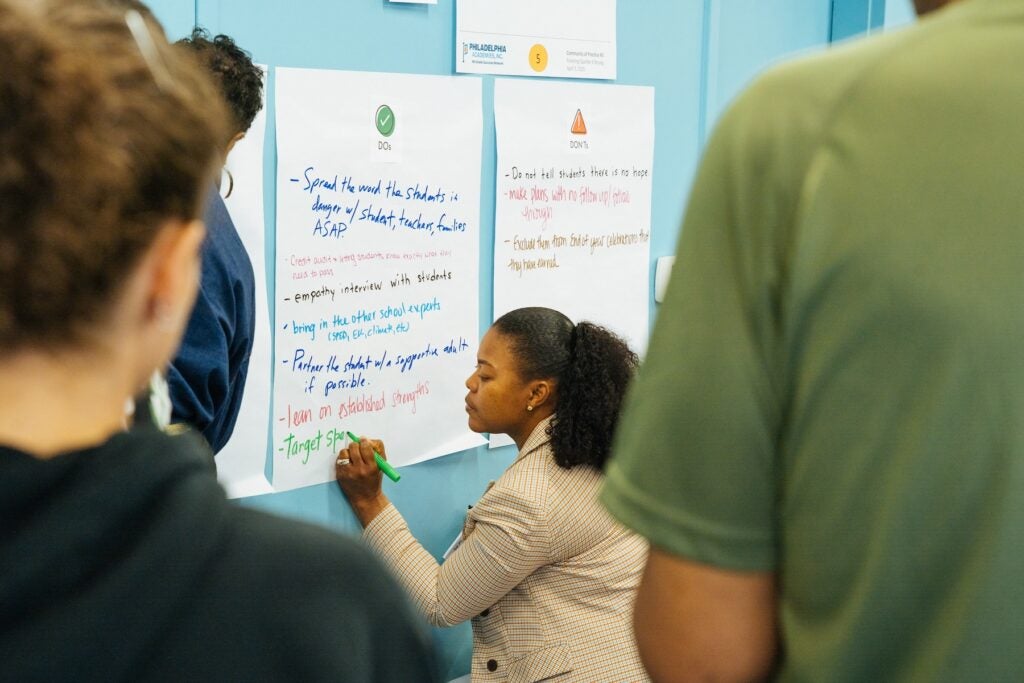
Four-year graduation rates in the district overall have jumped by 10.2% in the past seven years, which officials credit, in part, to the 9th Grade On-Track program. The city is still about 10 percentage points below the national average of 87%.
“It just made me feel like there was someone there who’s watching me, like, caring about me,” Sims said. “Meeting with somebody and them telling you, ‘Okay, you’re doing good,’ or, ‘You can improve in this class.’”
Schools in the 9th Grade Success Network have seen a 7.4% rise in students deemed “on-track” to graduate between the 2018-2019 to 2023-2024 school years. Black boys, in particular, saw a 13.4% increase in their on-track rate while their counterparts outside the network saw a decline of 5.6%.
The program hinges on two research-backed assertions: A student’s academic success in ninth grade is a pivotal indicator of whether they will graduate, and having a supportive bond with a teacher or advisor can be a powerful way to turn things around.
Amanda Mahoney serves as one of Samuel Fels High School’s assistant principals. She leads the “on-track” effort among her staff.
“When I think about the ninth-grade academy work, it is about keeping kids on track, for sure,” Mahoney said. “But the methodologies … center around building sincere relationships.”
How it works
Before the school year starts, a team of ninth-grade teachers, advisors and an assistant principal in each school reviews student data, examining how incoming freshmen performed throughout middle school.
Once the first quarter is in full swing, staff members gather for a foundational step: relationship mapping. They sit down together and list every ninth-grade student whom they have some kind of relationship with, or who might see them as a safe space. Once everyone has contributed their data, the group identifies which students were not listed on the “relationship map.” Then, they strategize on who would be best suited to connect with that student and design the right steps to create that trust.
One staff member might “be able to form a really natural bond with somebody that someone else can’t, or who it’s not happening for,” explained Nadia Schafer, director of 9th Grade Success Network at Philadelphia Academies, Inc.
“That is why you need the team of people to come together around young people,” Schafer said. “That’s where the power happens.”
For Mahoney, the process of getting every last student on the team’s radar is personal. She was one of the kids who fell through the cracks during her transition to high school. She said she was “skipping school like crazy,” in ninth and 10th grade. When she failed both years, no one at school reached out to let her family know.
Later, when she became a teacher, Mahoney realized that her high school years would have looked much different if even one staff member had been intentional about checking in on her.
“I decided I wanted to be the type of educator that little Amanda didn’t have,” she said. “It sounds corny, but that’s really how I approached this ninth grade. I don’t want my kids falling between the cracks.”
Mahoney’s team, and all others in the 9th Grade Success Network, ensure students have regular one-on-one check-ins with advisors or teachers. The team meets weekly to assess students and their own progress in pushing them forward, while brainstorming next steps.
“We’re in a constant state of, like, ‘Does this work? Is it something that kids are benefiting from? Do we see results from it?’ And if we don’t, then we shift,” said Northeast High School Vice Principal Brad McDaniel.
Equipped with stipends, data tools and regular coaching from PAI, staff members have a wide variety of intervention and morale-boosting strategies to pull from. Ninth-grade teams can focus on both individual students and the grade as a whole, working on creating a more positive culture, officials said.
Northeast runs peer-to-peer support groups. Samuel Fels puts on “freshman feel-good Fridays,” where the last period of the day is reserved for students to hang out, connect and snack on pretzels and water ice. Both schools make sure to take students on field trips throughout the year.
Mahoney said she tracks students’ attendance and grades on a weekly basis. If problems arise, she gets to the bottom of it.
“I have to do it on Saturday mornings,” she said. “It matters, though.”
The program will bring the total number of participating high schools up to 32 by 2027. Mahoney said she would love to see a day when the support structure can expand into the following years of high school. Right now, although the program is continuing to help raise graduation rates, she sees some students struggle again in 10th grade.
“Hopefully the district will see the importance of it and create something in our schools where we can do that,” she said. “It’s going to take money to do it.”
For now, high schoolers in the network say they continue to draw strength from the bonds and encouragement. Davronov is taking AP classes in world history and Spanish at Northeast High. He said that he never expected to be taking those college-level courses at the start of high school. His teachers’ continuous support, even when he had to turn in assignments late because of family responsibilities, made all the difference, he said.
“When I was coming in from middle school into ninth grade, I was very uncomfortable with myself,” Davronov said. “I didn’t know how smart I could be. But the teachers saw that first thing, and they mentioned it to me, and they helped me be where I am today.”
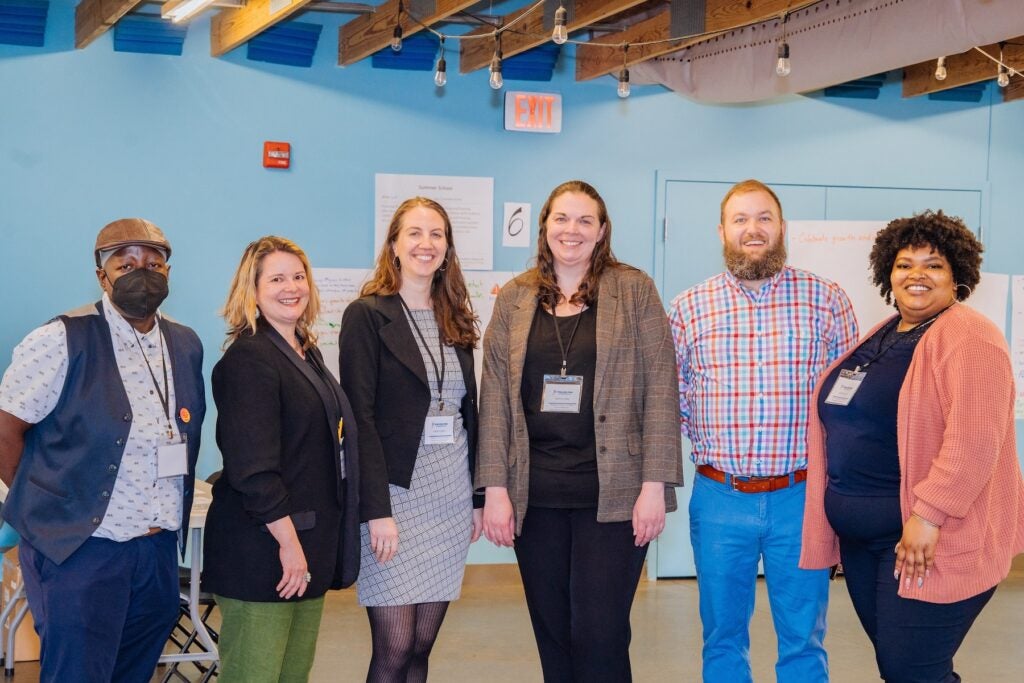
Editor’s Note: The Neubauer Family Foundation is a WHYY supporter. WHYY News produces independent, fact-based news content for audiences in Greater Philadelphia, Delaware and South Jersey.
This story has been updated to reflect that 9th Grade On-Track received $2.6 million from the School District of Philadelphia and $8 million from the Neubauer Family Foundation.

Get daily updates from WHYY News!
WHYY is your source for fact-based, in-depth journalism and information. As a nonprofit organization, we rely on financial support from readers like you. Please give today.


